|
|
|
Sort Order |
|
|
|
Items / Page
|
|
|
|
|
|
|
| Srl | Item |
| 1 |
ID:
132897
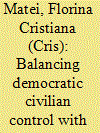

|
|
|
|
|
| Publication |
2014.
|
| Summary/Abstract |
This article reviews Romania's intelligence reform after 1989. Specifically, it looks at intelligence reform before and after Romania's accession to the North Atlantic Treaty Organization (NATO) in 2004, and the European Union (EU) in 2007. It finds that Romania has made considerable progress in intelligence reform. That is because Romania, which expressed its desire and commitment to join NATO/EU after 1989, has worked hard to comply with these organizations' membership demands (including intelligence reform). After NATO/EU integration (when demands on balancing control and effectiveness virtually vanished), despite continued openness efforts made by agencies, control/oversight diluted. Thus, post-NATO/EU, while effectiveness is being strengthened, democratic control lessens.
|
|
|
|
|
|
|
|
|
|
|
|
|
|
|
|
| 2 |
ID:
133937
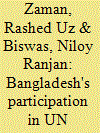

|
|
|
|
|
| Publication |
2014.
|
| Summary/Abstract |
This article argues that the participation of the Bangladeshi armed forces in UN peacekeeping has produced positive benefits for civil-military relations in the country and that this process is best explained by reference to concordance theory, as propagated by Rebecca Schiff. Unlike traditional theories of civil-military relations, concordance theory highlights dialogue, accommodation and shared values or objectives held by the military, the political elites and society. We argue in this paper that peacekeeping has gradually emerged in Bangladesh as an issue where all three partners are converging and prone to hold similar views. This may have a profound impact upon Bangladeshi politics whereby the chances of military intervention in domestic politics will lessen. This paper helps in understanding the implications of Bangladesh's involvement in UN peace missions, an issue on which little work has been conducted until now despite the fact that it has important implications for both the Bangladesh state and its armed forces.
|
|
|
|
|
|
|
|
|
|
|
|
|
|
|
|
| 3 |
ID:
133671
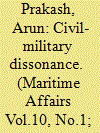

|
|
|
|
|
| Publication |
2014.
|
| Summary/Abstract |
The civil-military equation has been assigned great significance in the national security matrix, and experts consider that nations that fail to evolve a stable paradigm of civil-military relations squander their resources and run grave security risks. In India, this issue has failed to receive the importance it deserves because of the general indifference of the politicians to national security affairs on one hand, and the vested interest of the bureaucracy in maintaining the status quo on the other. It is believed that civil-military relations constitute a zero-sum game in which "civilian control" is retained by reducing the power of the military vis-à-vis the civilians. An irrational but subliminal fear of the military has led the Indian politicians to skew the civil-military equation in favour of the bureaucracy and, in a paradigm unique to India, to place the military under their control. Pointing to the military's sense of grievance and the vitiated atmosphere that prevails in the Ministry of Defence, the author reflects on the price being paid by the nation for endemic "civil-military dissonance" in terms of major national-security shortcomings, as well as the damage being inflicted on the institution of our armed forces.
|
|
|
|
|
|
|
|
|
|
|
|
|
|
|
|
| 4 |
ID:
132529
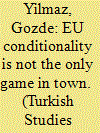

|
|
|
|
|
| Publication |
2014.
|
| Summary/Abstract |
Despite the weakened push by the European Union (EU) conditionality across time, Turkey's Europeanization process continues in a number of areas selectively. Focusing on such a puzzling trend, this article critically examines the role of EU conditionality on Turkey's Europeanization and unpacks domestic drivers of change. The article explores the impact of grassroots actors ?Turkish civil society organizations, business interest groups, media and political parties? on domestic change in the last decade and argues that continuing reforms in many areas in an era of limited EU-push are influenced by domestic actors.
|
|
|
|
|
|
|
|
|
|
|
|
|
|
|
|
| 5 |
ID:
131471
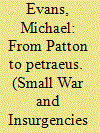

|
|
|
|
|
| Publication |
2014.
|
| Summary/Abstract |
War is the great auditor of military institutions and since the attacks of 9/11, the United States military has been under audit for well over a decade - the longest period of continuous warfare in its entire history - and one in which strategic success seems at best, ambiguous and at worst, elusive. Not surprisingly, the strategic skill and battlefield effectiveness of the American military has been a subject of great inquiry over the last five years. Thomas E. Ricks's mammoth study, The Generals: American Military Command from World War II to Today is but the largest instalment in a plethora of works examining America's military performance in the modern era by such writers as David Cloud and Greg Jaffe, Stephen R. Taaffe, Lewis Sorley, Jean Edward Smith, and Fred Kaplan.1
|
|
|
|
|
|
|
|
|
|
|
|
|
|
|
|
| 6 |
ID:
130229
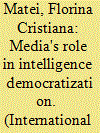

|
|
|
|
|
| Publication |
2014.
|
| Summary/Abstract |
In their path toward democratic consolidation, emerging democracies endeavor to ensure the democratic transfer of political power, bring changes in the legal framework, transform their executive, legislative, and judicial systems, boost free market economy, and develop robust and functional civil societies. They also institutionalize democratic civil-military relations (CMR) by establishing new security institutions-military, police, and intelligence agencies-that are under democratic civilian control, effective, and efficient. Of these many tasks, the democratization of intelligence agencies is by far the most daunting, as effectiveness and efficiency involve secrecy, while democratic control implies transparency, openness, and accountability. Nevertheless, democratic reform of intelligence in new democracies, though difficult, is not impossible, if and when civilians are interested and willing to "invest" in intelligence and intelligence reform. The contribution of external factors, such as media, 2 civil society, international groups, and individuals involved in human rights, may also be instrumental in achieving a balance between control and effectiveness of intelligence
|
|
|
|
|
|
|
|
|
|
|
|
|
|
|
|
| 7 |
ID:
133996
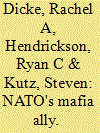

|
|
|
|
|
| Publication |
2014.
|
| Summary/Abstract |
By a number of accounts, NATO's membership expansion has been viewed favorably, with many analysts pointing to the positive impact NATO's enlargement has on the democratic development of civil-military relations across Central and Eastern Europe. Within this context, Mosès Naím's recent essay in Foreign Affairs was especially striking due to his piercing criticism of Bulgaria due to its significant problems with internal domestic corruption. We examine the potential impact of a Bulgarian mafia-oriented society on NATO from three perspectives, which include assessments of Bulgaria's military, its military capabilities-including its recent weapons purchases-as well as its willingness and ability to participate in NATO's major operations. In our view, these measures provide at least a partial assessment of Bulgaria's role within the alliance in an era that parallels claims of widespread corruption. The findings suggest that Bulgaria's corruption does have some impact on its ability to contribute to NATO's major alliance objectives, which apart from the deleterious impact on Bulgaria, also has broader implications for NATO's ongoing interest in membership expansion.
|
|
|
|
|
|
|
|
|
|
|
|
|
|
|
|
| 8 |
ID:
134173
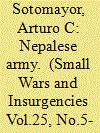

|
|
|
|
|
| Publication |
2014.
|
| Summary/Abstract |
Can peacekeeping participation help reform military institutions in democratizing states? Drawing on evidence from Nepal - one of the world's largest troop contributors to UN peacekeeping operations - this essay illustrates that participation in peace missions can sometimes undermine security sector reform and deteriorate civil-military relations. Furthermore, this analysis shows that peacekeeping participation will not necessarily reorient troops away from their conventional internal roles (such as counterinsurgency) or improve civilian control over the armed forces. Hence, civilians can lose control over soldiers just as frequently when they are deployed overseas as when they are at home.
|
|
|
|
|
|
|
|
|
|
|
|
|
|
|
|
|
|
|
|
|